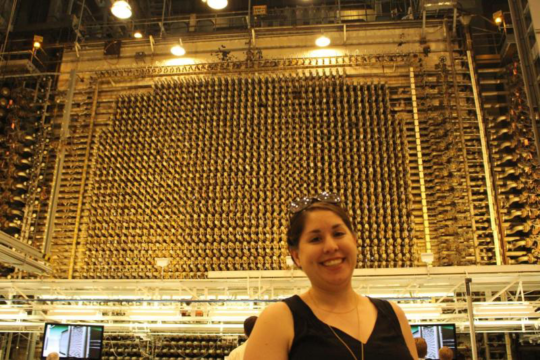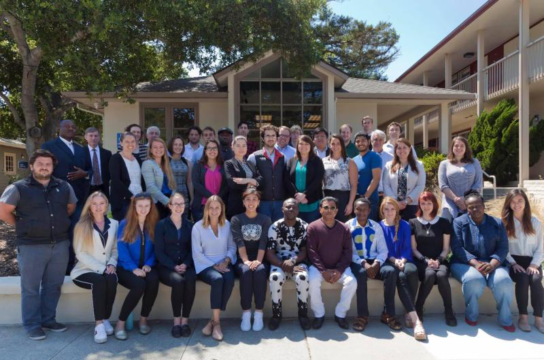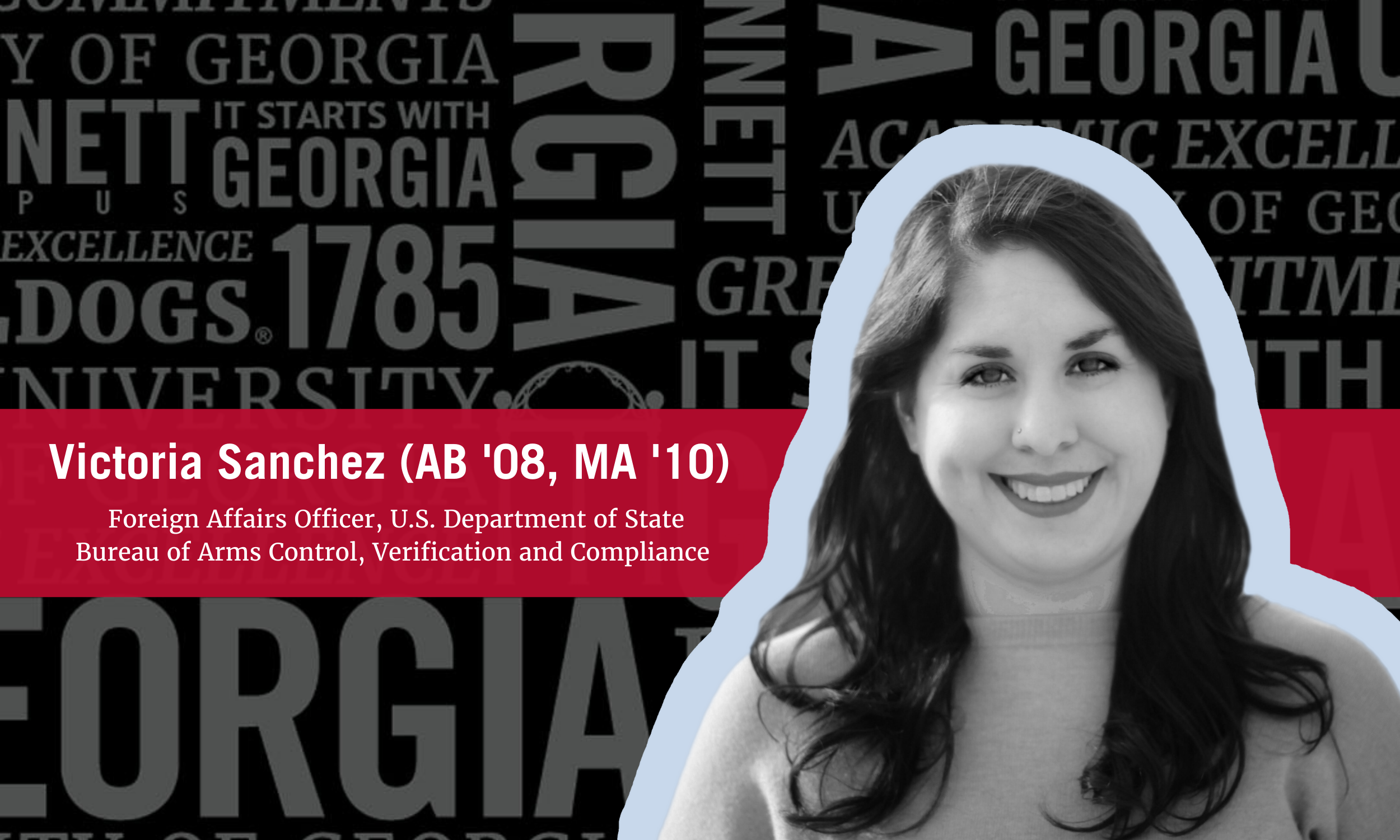UGA’s annual 40 Under 40 event celebrates alumni who have shown significant leadership and achievement in their careers and communities. Some of these awardees, however, manage such high-stakes projects that they stand out from even this elite group.
SPIA alumna Victoria Sanchez (AB ’08, MA ’10) is one such standout. As a Foreign Affairs Officer at the U.S. Department of State within the Bureau of Arms Control, Verification and Compliance, she helps maintain international security by managing nuclear weapons policy.
From a young teenager, Sanchez showed a remarkable level of ambition and ability. She began college at 14 and graduated with her UGA undergraduate degree at 18, the age at which most of us first stumble onto campus.
On that campus, the world of public and international affairs beckoned. Sanchez joined a study abroad experience in Croatia and Bosnia under the guidance of international affairs professor Jaroslav Tir, and worked on securities studies with Patricia Sullivan. In her haste to finish her international affairs undergraduate degree “on time,” said Sanchez, she chose efficiency over depth and breadth of experience, but quickly remedied the issue.

Sanchez pictured in front of the B reactor, the first full scale nuclear reactor in the world which produced plutonium for the U.S. nuclear weapons arsenal, including the first nuclear bomb detonated at the Trinity Site and in the bomb dropped over Nagasaki. (Photo source: LinkedIn)
“Part of the decision to stay for the master’s degree,” she said, “was because I didn’t have enough time to fully experience the SPIA classes, professors, and coursework.”
Once she entered the graduate program, she looked to engage with UGA’s Center for International Trade and Security, taking on an independent study course with CITS researcher Dmitriy Nikonov on arms control.
Just as impactful, said Sanchez, was a graduate course on intelligence with Loch Johnson.
“I will say now, working in a field where I have access to a lot of information, that course is probably one that I come back to the most,” she said. “On the policy side of things, I get fed information and pieces of intelligence. I think it is very important to understand how that product was derived and what the motivations behind it might be, how the bureaucracy might impact it, and how the origins of it cast a long shadow.”
After UGA, Sanchez returned to academia to earn a PhD in political science and international relations from the University of Delaware, focusing on comparative policy change following nuclear accidents. With the help of a fortuitous internship, she realized she preferred the more-tangible outcomes of policy work to research and teaching.
“In the fifth year of my PhD program,” she said, “I interned at the State Department, in the Office of Multilateral Nuclear Affairs. It was a very eye-opening experience because it showed me what type of work you can do in public service, and the real results that can be accomplished. I knew that was the type of path that I would want to try to find myself on.”

Sanchez (2nd row, 2nd from right) pictured in 2018 during a week-long seminar on International Nuclear Safeguards Policy in Monterey, California. (Photo source: LinkedIn)
When the internship ended, Sanchez joined International Technology and Trade Associates (ITTA), a private D.C. consulting firm. As an analyst, her portfolio covered nuclear nonproliferation and nuclear energy, and she worked on topics such as new reactor licensing, reprocessing and fuel cycle programs, civilian nuclear cooperation agreements, market analyses, government incentive programs, decommissioning procedures, and regulatory and political risk.
“[ITTA] was actually a really good nexus point between my academic background and my policy interests, and a great first professional experience,” said Sanchez. “They work largely with foreign governments to advise them on development and U.S. policy regulations, and we did hands-on training for them.”
Following that, Sanchez looked to return to security issues, which are largely centered in the government. Luckily, the security clearance from her State Department internship made the process simpler. She took a position at the Pentagon as a contractor with Toeroek Associates, Inc., working on arms control implementation and compliance for nuclear, chemical, biological, and conventional treaties and agreements.
Sanchez’ dream, however, was to earn a position working for the government itself, not a contractor.
“I was finishing my PhD while I was working [at Toeroek],” she said, “[so] I applied for a graduate fellowship program (the National Nuclear Security Administration Graduate Fellowship program, or NGFP) that focuses on nuclear career professionals. You get hands-on experience alongside government officials and have the opportunity to convert that into a permanent position.”
The move paid off, and in 2019, Sanchez officially began her career with the U.S. Department of State. As a treaty analyst, she worked a portfolio focusing on strategic arms control issues with Russia and nuclear disarmament verification. In this role, she coordinates with foreign counterparts, drafts material for dialogues with high-level officials or Congressional testimony, and works on treaty implementation issues.
“Right now, we only have one major arms control treaty left with the Russians, called the New START Treaty,” said Sanchez. “The treaty allows the U.S. and Russia up to 18 inspections per year at nuclear weapons bases where they can look at permitted items. Occasionally, there are differing views about how each country interprets the treaty. On the policy side, I work with the implementation body, which meets twice a year, for a few weeks in Geneva, Switzerland to try to remedy those disagreements. It’s fascinating work because it combines highly technical knowledge of nuclear weapons with policy development, legal analysis, and military procedures.”
“One of the things I really like about that type of work,” she continued, “is that it is outward-facing to our foreign counterparts. I interface directly with the Russian government, which not a lot of people get to do.”
Sanchez has internal responsibilities as well. She works closely with counterparts in the U.S. Congress, the White House, the intelligence community, and other Departments, such as Defense and Energy. She meets and briefs officials from local embassies in D.C. and engages with them directly on U.S. policies.
“You have to find cohesion with all of those people and make sure that you’re aligned on policy,” she said. “I like that aspect. I don’t think there are many places where you can do both: collaborating across the government while facing outward as well.”
In March 2021, Sanchez accepted a special assignment to the Office of Under Secretary of State for Arms Control and International Security. There, working for one of the highest officials at the State Department, Sanchez took on a broader arms control portfolio, to include issues such as chemical and biological weapons, outer space, and applications of emerging technology. She also provides wide administrative and strategic support to the Under Secretary and represents that official’s interests across the Department.
“I make sure that our equities are properly represented throughout the whole State Department,” she said. “I coordinate with the geographic bureaus and work with, say, European Affairs, to make sure that arms control issues are aligned with our policy objectives in that region.”
Sanchez also represents the interests of the Under Secretary in policy and interagency meetings, in which stakeholders from across government discuss policy positions.
“In the policy meetings,” she said, “there may be a given topic up for decision by senior leadership, which will usually bring input from across the State Department, the Department of Defense, the Department of Energy, the intelligence community, or the White House. These bodies sometimes make decisions, but they often also request further analysis or policy options, which kicks off a cycle of more work.”
Sanchez also works on issues have attracted presidential attention.
“[For example], trying to limit the risk of nuclear war is often a top-level priority among leaders,” she said. “In the work that I do with the Russians, we are building on the meeting that President Putin and President Biden had back in Geneva in the summer of 2021. Both leaders have acknowledged the value of nuclear arms control agreements, and sustaining them in the future will continue to be important. The last arms control treaty remaining between the U.S. and Russia is only good for a few more years, so new negotiations will have to begin in earnest if we want to maintain limits on our nuclear arsenals.”
If this sounds like a full plate, it is.
“The work is constantly changing every day, which is one of the great things about it,” said Sanchez. “It’s never dull.”
Recognizing the value of diverse perspectives in her field, Sanchez invests heavily in mentorships, serving on career day panels for the nuclear security policy field and advising would-be professionals on accessing the discipline. During her graduate program at UGA, Sanchez participated in a month-long, government-paid course at Brookhaven National Laboratory in New York, one of the national labs working on nuclear safeguards, and she recommends that students look for similar opportunities.
“A lot of programs are built for early-career professionals and students, to see how [nuclear safeguards] work in practice,” she said. “I would encourage people who think that they want to be a part of the field to go and find those programs.”
She also recommends listservs and websites listing opportunities for programs, internships, jobs, and other opportunities.
“I think there’s a lot of room within the nuclear field to contribute, even if you might not know a lot,” Sanchez said. “I think it’s really important to attract new ideas and fresh people. A lot of the people in the field are left over from the Cold War, and they are going to start retiring soon. That was partially what got me into the field. It’s an area with a lot of space to grow into, and I feel lucky to have found the niche I am in.”

